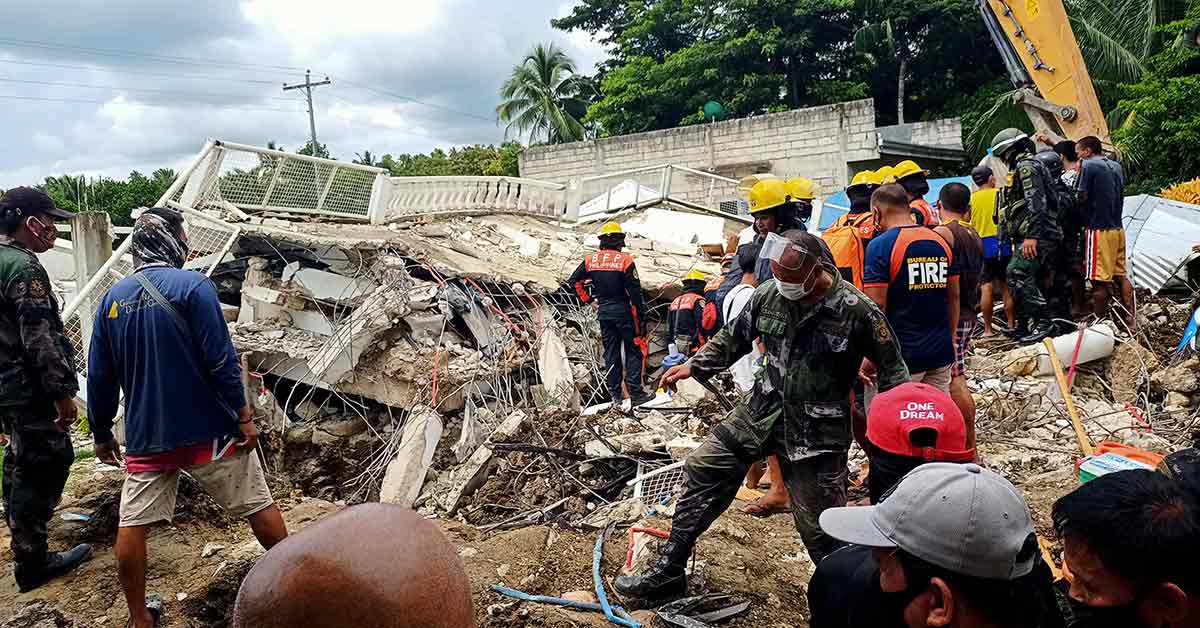At least one person was killed and dozens injured when a 6.6-magnitude earthquake shook the central Philippines on Tuesday, sending residents fleeing their homes and damaging buildings and roads.
The shallow quake struck southeast of Masbate Island in the Bicol region at 8:03 am (0003 GMT), the United States (US) Geological Survey said.
"There are a lot of damaged houses," said Staff Sergeant Antonio Clemente in Cataingan, a town of about 50,000 people on the impoverished island several kilometres west of the epicentre in the Samar Sea.
"It was really strong."
Local radio station reporter Christopher Decamon said he saw emergency workers pull the body of a man from the rubble of a three-storey house on the outskirts of Cataingan. The man's wife escaped unharmed.
The earthquake "was really strong. Our people were broadcasting at the time but they just ran out of the building," Decamon told reporters by telephone.
Police confirmed the man's death and said 18 people were also injured in the town. But mayor Felipe Cabatana told the media about 48 were hurt, most of them hit by falling shelves and furniture inside their homes.
"I thought it was the end of the world," said Cabatana referring to the quake's strength.
In nearby Palanas, at least 27 people were injured after being hit by falling objects or when their motorbikes crashed as the ground moved in the town, Chris Adique, a municipal disaster officer, told a local radio.
None were in a critical condition, he added.
Search and rescue efforts were still underway in the region.
The quake struck as the archipelago battles surging numbers of coronavirus infections, with more than 169,000 cases and restrictions on movement that vary across the country.
A lockdown affecting a quarter of the population, including the capital Manila, will be eased Wednesday.
Cabatana said between 5,000 and 6,000 people would spend the night sleeping outside in Cataingan because emergency shelters were being used as COVID-19 quarantine centres, some of which were also damaged in the quake.
"Our most urgent concern is temporary shelter because our funds have run out having been allocated for COVID," he said.
The government said help would be made available.
"These natural disasters are a part of our lives and we always recover," said Harry Roque, spokesman for President Rodrigo Duterte.
"People should not worry about getting relief assistance. They will be provided."
Dozens of aftershocks have rocked the region.
'Dizzying'
A video posted on Facebook and verified by AFP showed light damage to a food market in Cataingan.
Overturned buckets and small fish were scattered on the ground and chunks of cement had fallen from a pillar. People stood outside on the street.
Philippine Red Cross chairman Richard Gordon tweeted photos taken by his colleagues showing buildings in Cataingan with corrugated iron roofs fallen in.
Other photos taken in nearby Uson town show a sealed road with a large crack across it.
The quake was felt hundreds of kilometres away.
In the city of Iloilo about 400 kilometres (250 miles) southwest of Masbate in the neighbouring Visayas region, residents ran out onto the streets.
"It was strong, dizzying," said police Colonel Eric Dampal.
"Almost everyone inside buildings rushed to the streets."
The Philippines is situated on the Pacific "Ring of Fire", an arc of intense seismic activity that stretches from Japan through Southeast Asia and across the Pacific basin.
A 6.8-magnitude quake struck the southern island of Mindanao in December, killing at least three people, injuring dozens and damaging buildings. - AFP
